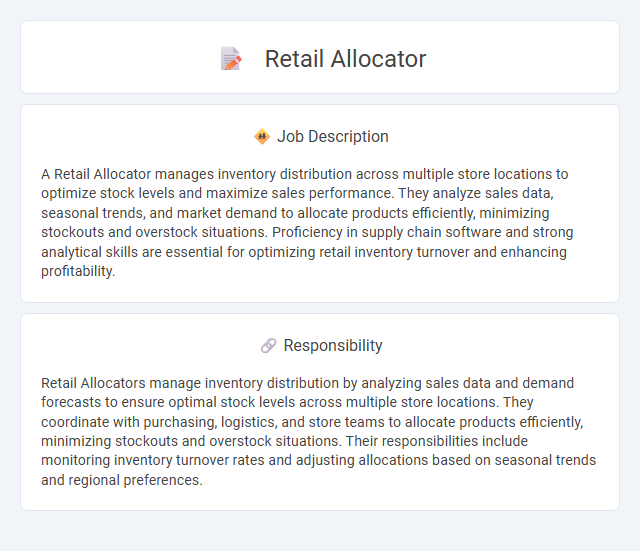
A Retail Allocator manages inventory distribution across multiple store locations to optimize stock levels and maximize sales performance. They analyze sales data, seasonal trends, and market demand to allocate products efficiently, minimizing stockouts and overstock situations. Proficiency in supply chain software and strong analytical skills are essential for optimizing retail inventory turnover and enhancing profitability.
Individuals who are detail-oriented and possess strong analytical skills are likely suitable for the Retail Allocator job, given the need to manage inventory distribution accurately. Those comfortable working with data, forecasting demand, and collaborating with multiple departments might find this role fitting. People who prefer repetitive tasks without much variability may not thrive in this position, as adaptability and problem-solving are often required.
Qualification
A Retail Allocator must possess strong analytical skills and proficiency in inventory management software to optimize stock levels across multiple store locations. A background in supply chain management, business analytics, or a related field enhances the ability to forecast demand accurately and allocate resources efficiently. Excellent communication skills are essential for collaborating with sales teams and suppliers to ensure alignment on inventory strategies and sales objectives.
Responsibility
Retail Allocators manage inventory distribution by analyzing sales data and demand forecasts to ensure optimal stock levels across multiple store locations. They coordinate with purchasing, logistics, and store teams to allocate products efficiently, minimizing stockouts and overstock situations. Their responsibilities include monitoring inventory turnover rates and adjusting allocations based on seasonal trends and regional preferences.
Benefit
A retail allocator likely improves inventory distribution, increasing the probability of higher sales and reduced stockouts across stores. This role may contribute to optimized shelf space utilization, potentially enhancing customer satisfaction and store performance. Efficient allocation could also lead to cost savings by minimizing overstock and markdowns.
Challenge
The Retail Allocator role likely involves managing complex inventory distribution to optimize stock levels across multiple store locations, presenting a significant challenge in balancing supply and demand. It may require analyzing sales data and market trends to predict product movement with accuracy, which could be demanding in a dynamic retail environment. Effective communication and decision-making skills might be crucial for overcoming logistical obstacles and ensuring timely product allocation.
Career Advancement
Retail Allocator roles involve optimizing inventory distribution to maximize sales and minimize stockouts, creating key opportunities for career advancement in supply chain management and retail operations. Professionals can progress to senior positions such as Senior Allocator, Inventory Manager, or Supply Chain Analyst by demonstrating strong analytical skills and strategic decision-making. Mastery of data analytics and forecasting tools enhances prospects for leadership roles, including Director of Inventory Planning or Merchandise Planning Manager.
 kuljobs.com
kuljobs.com